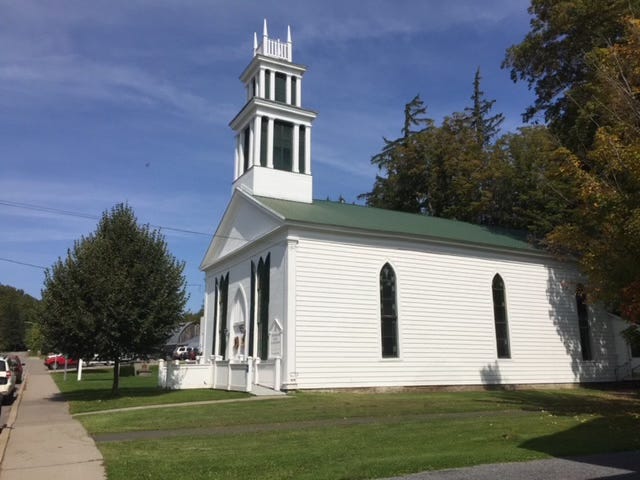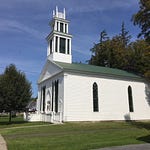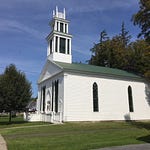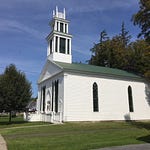Dear Friends,
Nearly twenty years ago, I wrote an essay to my Episcopal friends on the irreversible schism about to take place in the Anglican Communion over the issue of same-sex marriage. I was not alone; the handwriting was on the wall.
I’d studied the issue in preparation for writing a play about same-sex blessings in 1999, the precursor to same-sex marriage (“The Presentment,” Pasadena Playhouse, March 1999). Still, I found myself in November of 2003 surprised and disappointed by the consecration of Bishop Vicki Gene Robinson (his birth name), the first Episcopal priest in an openly gay relationship to be consecrated as a bishop.
Now, two decades later (and having left the Episcopal Church for a more orthodox community of faith), it was brought to my attention five days ago that the pastor of San Diego First Church of the Nazarene, Selden “Dee” Kelley, had been “required to surrender his credentials” for “violation of denominational clergy standards” by the Church of the Nazarene Regional Court of Appeals.
Church polity can be confusing, so, in way of context, I quote directly, though in part, from the San Diego Union-Tribune, August 18, 2023:
A popular pastor who led San Diego First Church of the Nazarene for 17 years has lost his job after penning an essay that disagrees with religious doctrine forbidding same-sex marriage. Written by former Senior Pastor Selden “Dee” Kelley III, the treatise is titled “A Hope for Change.”
Kelley confirmed by email Thursday that denominational Nazarene leadership informed him on Aug. 14 that a “denominational judiciary process” found that he was “in violation of denominational clergy standards” because of his essay. The pastor…has appealed the church’s decision. Kelley also confirmed that Thomas Taylor, superintendent of the Southern California District of the Church of the Nazarene, asked for his resignation and, when it was not forthcoming, started the hearing process….
The pastor’s essay summarizes the Church of the Nazarene’s stance on same-sex relationships, citing a ruling in 2019 which found that “a person with same-sex attraction who feels called to ministry must commit to a life of celibacy” and that clergy “shall not bless or perform same-sex marriage ceremonies.”
The pastor (Kelley) expresses his discomfort in ministering to same-sex couples…. “I am unable to justify telling a couple, who are in love with Christ and each other, seeking godly counsel, and participating in the life of the church, that I must refuse them blessing and participation in the sacrament of marriage,” Kelley writes. Withholding his pastoral blessing, he adds, is impossible.
Now, fast-forward to this past week. I quote, in part, from THE POINT at lomabeat.com, December 10, 2023, the school newspaper for Point Loma Nazarene University:
The Church of the Nazarene Regional Court of Appeals upheld the guilty verdict from the Southern California District Advisory Board and rejected former Senior Pastor of San Diego First Church of the Nazarene (SDFC) Dee Kelley’s appeal on Nov. 20, confirming that he is required to surrender his credentials.
The appeal verdict follows Kelley’s Sep. 9 filing after he was determined guilty of false teaching of human sexuality and stripped of credentials by the Church of the Nazarene Regional Board of Discipline’s (RBD) on Aug. 14.
That decision was appealed by the good Rev. Kelly/upheld, and now Kelley has the option for one last appeal to global representatives from the denomination, according to paragraph 608.2 of the Manual, to the General Court of Appeals rather than the regional court. On Dec. 4, he submitted the appeal to the General Court of Appeals.
Watching all of this unfold, I feel a little like Yogi Berra, experiencing "Déjà vu all over again." Though in 2003 I was coming from a more liberal position, that same warning to my Episcopal friends then holds true for my Nazarene friends today.
I was brought up in the Church of the Nazarene under the ministry of Dr. Irving Laird, pastor of the Broad Ripple Church of the Nazarene in Indianapolis prior to his being Vice President of Student Life at Northwest Nazarene University. I attended Olivet Nazarene College for two years (now Olivet Nazarene University), Bethany Nazarene College for a brief period (now Southwest Nazarene University), served as a youth evangelist in the church for several years, and eventually, after establishing my artistic bona fides in NYC for 12 years, acted, wrote, and directed five dramatic presentations for the Church of the Nazarene, including a musical play and subsequent movie on its founder, Phineas F. Bresee. As time has moved on, I’ve an increasingly warm spot in my heart for this Church: her loving people; its rich Wesleyan tradition; her witness to holiness in an increasingly wicked age; and her historical concern for the poor and marginalized.
It’s not lightly that I pass along “A Call To Stand Fast.” In some ways, it’s a mea culpa. I’ve been there, in the trenches regarding “human sexuality,” and have witnessed first-hand the deleterious effects a mindless inclusiveness can have on the Church and on one’s soul. The Episcopal Church lost the fight to our secular age, acquiescing to its more militant activists. May the Nazarene Church not be next. In way of a humble reminder: “Holiness unto the Lord” is your “watchword and song.”
A CALL TO STAND FAST, June 2004, Hollywood Hills
John Wesley, that great, 18th century evangelist of a wayward Anglican Church, understood the true status of a Bishop in society: “Men may call me a knave or a fool, a rascal, a scoundrel, and I am content; but they shall never by my consent call me a Bishop!” With that tongue-in-cheek assessment of a bishop’s worth duly noted, I’m wondering why the consecration of the Rev. V. Gene Robinson (Nov. 2, 2003) as Bishop of New Hampshire—the first Episcopal priest in an openly gay relationship to be consecrated as a bishop—has left this Episcopalian so deeply concerned. As an actor and playwright, my life has been surrounded and enriched by a number of close, gay friends. And, surely, it’s not as if the fate of the Episcopal Church USA (ECUSA) hinges on Robinson’s ascension to the Office of Bishop … or does it? This “consecration” was by no means unanimous: it was achieved by a 62 to 43 majority-vote by the House of Bishops. One may assume that those 62 bishops who laid hands on Gene Robinson in this ceremony of apostolic succession felt confident that they were following the leading of the Holy Spirit. Personally, I’m not so confident that a euphoric, whistle-filled, three-minute standing ovation is necessarily reflective of a movement by the Holy Spirit.
In stark contrast, there is a movement attributed to the Holy Spirit that is sweeping through the Global South, where tens of millions of people have joined the Anglican Communion and are confessing their faith in the risen Lord. That confession of faith, often at great cost, comes with a responsibility to live a life that is beyond moral reproach, and for these committed Christians, “practicing” homosexuality is not reflective of a life which they perceive as pleasing to God. That perception ought not to be disparaged. It is an integral part of their faith, and they share this belief with millions of Muslim neighbors, whose sensibilities we would not dare to question and offend. And yet, many in ECUSA have arbitrarily profiled these devout Christians in the Global South as naively mistaken—victims of a zealous, unenlightened church that reflects the endemic social prejudices of its culture. Unfortunately, this profile is a judgment replete with ecclesiastical arrogance and cultural hegemony. The truth is, it may be the “progressive” Episcopal Church that is reflecting the secular bias of its culture. The truth is, we may be the victims of a religious milieu that has dulled our minds to what is arguably the immutable mind of God. For if religious history has taught us anything, it has taught us that the Church is not inerrant in its ways, and history may prove the consecration of Bishop Robinson as a prime example. Viewed objectively, there is something about this consecration that feels self-centered rather than other-centered—the church full of self-congratulation and praise for its bold, progressive, and inclusive action. The LA Times quoted Bishop coadjutant Robinson as saying, “It’s not about me; it’s about so many other people who find themselves at the margin.” Yet ironically, this seemingly inclusive action has de facto excluded millions of believers in the greater Anglican Community. But then, exclusion has always been the prerogative of the Church.
By nature, the Church is inherently exclusive—and rightly so. Though the love of God is indiscriminately universal, the Bible presents us with a frequent leitmotif: “Narrow is the gate and difficult is the way which leads to life, and there are few who find it.” Harsh words for the postmodern ear, but a casual reading of the scripture informs us that salvation, while a gift, is ultimately a conditional one. “Not everyone who says to me, ‘Lord, Lord’ shall enter the kingdom of heaven, but he who does the will of my Father in heaven.” There is a life of probity to be lived. There is conduct acceptable and conduct unacceptable to the Church, and every denomination has the prerogative to determine what that “conduct unacceptable” is. Without the ability to govern itself, the Church falls victim to Dietrich Bonhoeffer’s prophetic warning of a “cheap grace,” a facile forgiveness of acceptance, affirmation, tolerance, and all-inclusive love—dispensed as easily as sacramental indulgences—completely disassociated from the moral claims of repentance and the personal demands of discipleship. The result is a Church that has lost its way, veering into spiritual free-fall. Sin has gone out of our religious lexicon, and in its place is a self-serving pop-psychology and biblical revisionism that manipulatively and quite creatively justifies nearly everything that goes on between consensual parties. And therein is part of the problem.
The age of consent in the United States varies, but in many states, one need be only 16 to have consensual sex—straight or gay. So how will the House of Bishops respond when a gay priest decides it is his or her civil and religious right to live openly in a relationship with a 16-year-old-young man or woman? Or even more problematic, what about the gay priest or bishop residing in France where the age of consent is 15, or in Italy where it is 14, or in South Korea, where the age of consent is 13. If the only prerequisite for cohabitation within the gay Episcopal priesthood is “commitment,” what possible reason could the church give for not recognizing the minimum age for a gay, consensual sexual relationship that is legally accepted by the State. Certainly, if the law accepts it, the church must accept it, otherwise, it runs the risk of being prejudicially exclusive, denying the couple their full civil rights. Apparently, there is nothing within the “core doctrine” of the church to prevent the House of Bishops from affirming these “committed” relationships; and while the idea of a gay priest living with an adolescent may appear unbecoming to the Episcopal aesthetic, there is everything within the gay liberation culture (including lawsuits) to promote it.
Inevitably, and fairly soon, the church will have to face this issue, and in keeping with the spirit of Bishop Robinson’s observation, here will be the perfect opportunity to embrace those who are truly “living on the margin,” and for the church to bear witness to its unconditional inclusiveness. Hard to believe?
All true progressives within ECUSA are now advocating that LGBTQ persons be given full access to the priesthood. This “progressive inclusiveness” will now be impossible to stop. What’s good for the gay person will be good for the bisexual person. What’s good for the bisexual will be good for the transgender/transsexual. And what’s good for the 21-year-old man living with a priest in a “committed” relationship will be good for the 16-year-old living with a priest in a committed relationship. With this decision to consecrate V. Gene Robinson as bishop, a Pandora’s box of moral considerations will consume the church: “Why can’t the holy sacrament of marriage, not just same-sex unions, be available for everyone, regardless of sexual orientation? Why can’t the single, heterosexual priest, like his gay counterpart, live openly with his partner outside the constraints of marriage? Why can’t a bisexual, who determines he or she needs two opposite partners to be a whole person, be able to serve in the clergy and live with both partners/spouses in the rectory? Isn’t it religious bigotry that prevents a transgender/transsexual from becoming a priest or a bishop? And since gender is fluid and sex no longer binary, may I not self-identify my sex depending upon how I currently feel? Isn’t the whole concept of marriage essentially irrelevant, a religious relic of a bygone era? After all, God and the sacrament of marriage don’t make a relationship holy, do they? Isn’t it our commitment one to the other that makes a relationship holy? And what do we really mean by the word committed? Can’t one be committed to an individual without having to be monogamous?” These and other such considerations will occupy the attention of the House of Bishops for years to come, leaving in its wake the church’s great commission: “A Charge to Keep I have, A God to glorify, A never dying soul to save, And fit it for the sky.” If there were sorrow in heaven, Charles Wesley would be weeping, accompanied by his brother, John, no doubt.
In the midst of such an obfuscating atmosphere, one thing is certain: the unity of the church—that collective ideal that we are one in the bond of love—has become a fabulation. We are more than simply in “impaired communion.” In truth, the Body of Christ has been profoundly fractured, and the resultant spiritual ripples will lead to a massive sea change, not only for the Anglican Community but for Christendom writ large. Already, ECUSA is in a “downgraded” relationship with the Catholic and Greek Orthodox Churches, let alone a diminished relationship with several fundamental, evangelical, and charismatic churches. We should have expected no less. For despite the blustery efforts to draw a parallel to racism and the ordination of women, this “consecration” has crossed a defining, and what is for many, inviolable line. When the implications are viewed historically, if not prophetically, only two conclusions can be envisioned: a Church ruptured or a Church repentant. If there remain men and women of conscience, a compromising “reconciliation” will not be an option.
Nearly five hundred years ago, Sir Thomas More, the man Samuel Johnson declared “...was the person of the greatest virtue these islands ever produced,” was beheaded by Henry the VIII because he refused to affirm Henry’s divorce from Queen Catherine and his subsequent marriage to Anne Boleyn. As depicted in Robert Bolt’s brilliant play, “A Man for All Seasons” (much of it taken from actual transcripts), Sir Thomas speaks candidly regarding his duty: “In matters of conscience, the loyal subject is more bounden to be loyal to his conscience than to any other thing.” Thousands of laity and clergy who have rejected the consecration of Bishop Robinson have a deep, historical loyalty to the Episcopal Church. But we should not think it strange, particularly in light of Thomas More’s ultimate sacrifice over the sanctity of marriage, that the consecration of an openly gay bishop has shaken this historic loyalty to its very core. The Anglicans who stand in opposition to this consecration are not narrow-minded Christians who can be dismissed as a homophobic fringe. They are deeply reflective Christians, who love Christ, their Church and all who enter its doors hungry to be filled by God’s grace; but they, like Thomas More, realize that there is a higher communion than the fellowship of like minds. Again, from a “Man for All Seasons,” the Duke of Norfolk asks Thomas: “Oh, confound all this...I don’t know whether the marriage was lawful or not. But…Thomas, look at those names...you know those men! Can’t you do what I did, and come with us, for fellowship?” Sir Thomas replies, “And when we stand before God, and you are sent to paradise for doing according to your conscience, and I am damned for not doing according to mine, will you come with me then, for fellowship?” Though he lost his life, it was in peril of losing his soul that Thomas More chose to follow his conscience. He refused to accept the authority of the King and his ecclesiastical entourage. He went against the popular tide, refusing to embrace this secular encroachment upon his Church. And much to the incredulity of the progressives within ECUSA, it is for this very same reason that so many bishops, priests and laypersons have rejected this consecration—they’ve chosen to follow their consciences. And it will not be without cost.
Those who stand against this consecration of Gene Robinson and the ensuing “progressive inclusiveness,” will be ridiculed as “naïve, unsophisticated, biblical literalists, prejudicial, homophobic and cruel.” By implication, if not directly to your face, you have been labeled these things already. There will be a concerted effort to marginalize you as a zealous remnant that is simply out of step with the cultural and religious zeitgeist. And though you will be tolerated as the outsider who has caused this impaired communion, the intimidation through financial, social and peer pressure will continue to mount, and like Sir Thomas More, you will be asked time and again to “...come along with us for the sake of fellowship.” Who among us will stand against this mounting pressure?
In this rare moment in the history of the Church—a time once again of profound reformation—God is calling all of us to stand fast. It will be no small task. It will take more than planning sessions. It will take more than confession. It will take more than all of our good intentions at “realignment” and “reconciliation.” And at the risk of apparent contradiction, it will take more than being led by one’s conscience. Dietrich Bonhoeffer wrestled with the question of “Who stands fast?” He determined that it was, “Only the man (or woman) whose final standards is not his reason, his conscience, his duty, freedom, or virtue, but who is ready to sacrifice all this when he is called to obedient and responsible action in faith and in exclusive allegiance to God – the responsible man who tries to make his whole life an answer to—the call of God. Where are these responsible people today?"
There are many in the Episcopal Church. They are even more in the greater Anglican Communion. And there are countless millions within Christendom. May our sole allegiance be to God. He calls us to stand fast for those who are seeking the faith. He calls us to stand fast for those who are weak in the faith. To stand fast for a Church in need of a sweeping revival, and to stand fast for a culture desperate for another “great awakening.” And here’s the good news to help and cheer us on our way: “He who calls you is faithful, who also will do it.” Stand fast, my brothers and sister in Christ, stand fast.
Amen
D. Paul Thomas, June 2004, Hollywood, CA
Slightly revised: December 2023, Indianapolis, IN
PS: I wish the good Rev. Dee Kelley all the best as he transitions to a denomination that will suit him better There are many who will welcome him with open arms and a salutary voice of approval. In the interim, let the Nazarene Church be the Nazarene Church, I pray.












